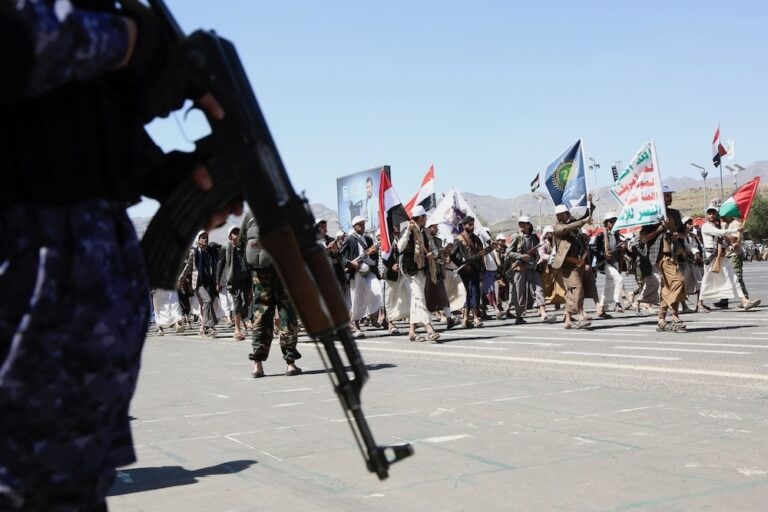(CPJ/IFEX) – The following is a CPJ press release: **Updates IFEX alert of 18 May 1999** Terry Anderson Calls for End of Press Harassment in Yemen, Raises Issue of Court Cases in Meeting with Prime Minister Sanaa’, Yemen, July 15, 1999 – In a meeting today with press freedom advocate Terry Anderson, Yemen’s prime minister […]
(CPJ/IFEX) – The following is a CPJ press release:
**Updates IFEX alert of 18 May 1999**
Terry Anderson Calls for End of Press Harassment in Yemen, Raises Issue of
Court Cases in Meeting with Prime Minister
Sanaa’, Yemen, July 15, 1999 – In a meeting today with press freedom
advocate Terry Anderson, Yemen’s prime minister said harassment and threats
against journalists are “abhorrent to our laws and ideals” and should be
condemned. He promised to investigate any cases that are reported to him.
Anderson, vice chairman of the New York-based Committee to Protect
Journalists (CPJ), met with Prime Minister Abdel Karim al-Iryani and other
Yemen officials to convey CPJ’s alarm over the sharp deterioration of press
freedom in Yemen in recent months.
He urged the Yemeni government to put an end to the harassment of media that
since February has brought to trial six independent and opposition
newspapers because of their political coverage and published criticisms of
the government. The approaching September presidential election has led
authorities to intensify press restrictions, according to some observers.
“We are committed to freedom of the press,” Prime Minister Al-Iryani told
Anderson. “We are ready to listen to any report of a violation and ready to
take action. There is not a single word in any law that hints of reprisals
or restraints on journalists. We highly condemn harassment and threats
against journalists. We want proof of any such actions. It is abhorrent to
our laws and ideals. We are open to complaints and the courts are open.”
Al-Iryani urged journalists who were harassed or threatened to file a formal
complaint with the human rights commission or with him directly. “If they
come to me we will take action,” he said.
However, Anderson said, Al-Iryani did indicate that the government will
continue to file court cases against journalists and newspapers that publish
what the prime minister referred to as lies. He refused to promise to end
censorship of foreign publications, saying such censorship is mainly for
ethical, not political reasons.
“We are pleased to hear the government publicly condemn attacks on
journalists and reaffirm its commitment to a free press and to observance of
human rights,” Anderson said after his meeting with the prime minister this
afternoon. “We remain concerned that the government intends to continue
filing court cases against journalists. We believe that no journalist should
be charged with a crime for reporting news or writing his or her opinion. We
hope that the government will return to the policies it followed immediately
after unification in allowing the greatest possible freedom of the press.
This is what Yemen needs as it continues to work on unifying the country and
achieving a full democracy.”
Anderson also met with Deputy Prime Minister Abdul Gader ba Jamal, who told
him that the government has set up a special forum to teach police and
security forces how to conduct investigations while observing human rights.
That forum is to begin work in September and October.
The deputy prime minister said, “There is a commitment by the government to
improve human rights. A dialogue with journalists about human rights will
continue. We are going to improve it. It is a national priority. We have no
way but to strengthen human rights in Yemen and strengthen democracy.”
“The transition between totalitarianism and democracy is not easy,” the
deputy prime minister added. “It takes time.”
Anderson voiced concern in his meetings about the trial against the editor
and a reporter of Yemen’s leading independent newspaper, the thrice-weekly
Al-Ayyam, charged by government prosecutors with instigating “national
feuds” and “the spirit of separatism” and harming “national unity.” The
charges were brought May 15 against editor Hisham Basharaheel and journalist
Ali Haitham al Ghareeb for a February article criticizing the fact that
Yemen’s southern provinces are governed by politicians from the country’s
north. Since Yemen’s 1994 civil war, tensions between north and south have
often focused on the issue of northern political dominance.
Basharaheel was also charged with violating a court order banning the
publication of proceedings of the trial of eight British nationals who were
then facing terrorism charges in Aden. The March 3 article summarized a
British Broadcasting Corporation (BBC) story reporting that the lawyer for
the eight men had urged the dismissal of their case on procedural grounds.
The court will hand down its verdict in both cases on July 18. If convicted,
Basharaheel faces up to three years in prison and fines totaling 80,000
rials ($540); Ghareeb could receive a one-year prison sentence and a 10,000
rial ($67) fine. Al-Ayyam could be closed indefinitely.
Anderson also called for an end to other forms of state harassment of the
media, which since February has included the arrest of editors and
reporters, suspension and censorship of publications, and extra-legal
harassment of journalists by security forces and presumed state agents. In
the past four months at least three journalists have been arrested, a
leading London-based newspaper banned, and an editor severely beaten by
unknown assailants. Journalists have complained of interruption of their
phone lines and surveillance by security forces.
Anderson, now a professor at the Scripps School of Journalism at Ohio
University, was Associated Press correspondent in Beirut in 1985 when he was
taken hostage by Shiite Muslim radicals and held captive in Lebanon for
nearly seven years.
The Committee to Protect Journalists is an independent, nonpartisan,
nonprofit organization that works to safeguard press freedom around the
world.


